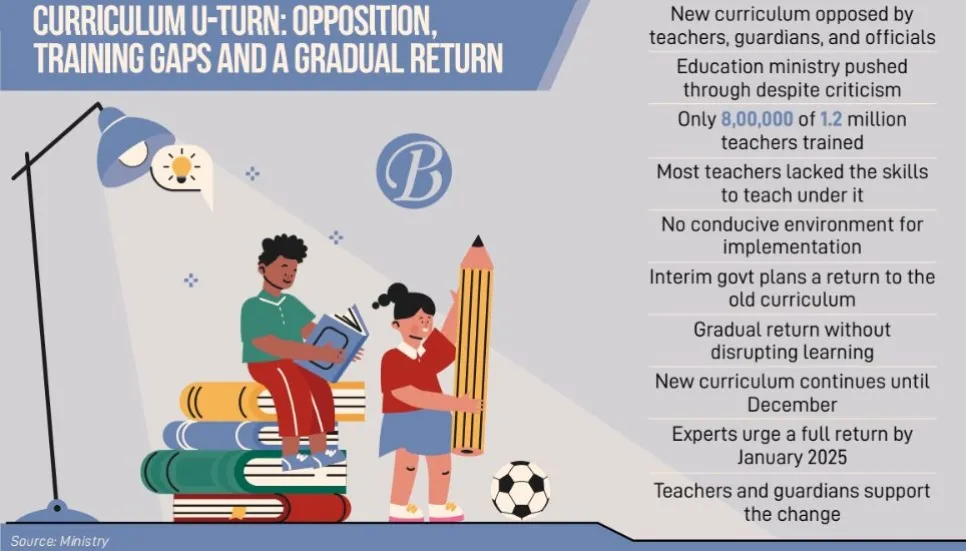
The new school curriculum, introduced by the ousted Sheikh Hasina-led government in 2023, has faced mounting opposition from the start, with teachers, guardians, and even some officials within the education ministry raising concerns.
However, the then-education ministry under the leadership of Dr Dipu Moni and Mohibul Hasan Chowdhury Nowfel remained firm in its decision to implement the curriculum, ultimately pushing it through despite the concerns.
Education experts had warned that the curriculum was introduced without adequately preparing teachers or considering classroom sizes, raising concerns about the challenges of implementing it.
Now, the interim government is seeking to revert to the previous curriculum, with the education ministry working in this regard. New textbooks aligned with the previous curriculum will be distributed from January next year, the ministry sources said.
The interim government’s education adviser Wahiduddin Mahmud said that the government would gradually return to the previous curriculum, as the new one appeared unfeasible to implement in Bangladesh.
“The previous curriculum will be brought back as much as possible without disrupting students’ learning. We will revise the curriculum according to the country’s needs and gradually shift back to the earlier curriculum,” he said.
Prof Dr Mohammad Siddiqur Rahman Khan, former director of the Institute of Education and Research at the University of Dhaka, told The Business Post that the education ministry had contracted him to revise the new curriculum.
“I have advised the ministry to continue with the new curriculum until December this year. During this period, the curriculum should be reshuffled. However, the government must return to the previous curriculum by January 2025,” he said.
Prof Siddiqur Rahman, who led the development of the creative curriculum in 2012, added that the government could continue with the old syllabus for one year (2025) but emphasised the need for a curriculum that meets the country’s requirements.
“The new curriculum was, in fact, unrealistic. The education ministry began its implementation without any research,” he said.
Professor Dr Mohammad Ali Zinnah of the Institute of Education and Research at Dhaka University told The Business Post that the new curriculum was introduced without adequately assessing the country’s financial and administrative capacities.
He criticised the approach as poorly planned and unrealistic, arguing that it made the curriculum unsuitable for Bangladesh.
“The new curriculum was developed without considering the country’s fi nancial situation, management capabilities, and was implemented in a completely arbitrary manner. It was overly ambitious and unrealistic, making it unfi t for implementation in Bangladesh,” he said.
The Ministry of Education has been working since 2017 to introduce an outcome-based curriculum modelled after the education systems of developed countries. This new curriculum was partially introduced for primary and secondary level students at the beginning of this year.
Teachers, guardians welcome the new move
Teachers and guardians across the country have welcomed the interim government’s decision to return to the previous curriculum.
Riaz Hossain, a school teacher in Bhola, told The Business Post that most teachers struggled with the new curriculum, as they were neither properly trained nor able to understand it.
“Many teachers received no training at all,” he said.
“The teachers were forced to teach classes despite being unprepared and felt helpless. I admit that the curriculum is good, but the number of teachers skilled enough to implement it was very low and the country lacked the conducive environment necessary for its effective execution,” he said.
Rakhal Raha, convener of the Sammilito Shikkha Andolan, said that they had been protesting against the new curriculum because their children were not acquiring adequate knowledge in their subjects under it.
“I thank the new education adviser for recognising the flaws in the curriculum. The government should take proper initiatives to develop a curriculum that suits the country’s overall situation,” he said.
Teacher training progress
There are approximately 1.2 million teachers at the primary and secondary levels across the country. By December 14, 2023, only 3,00,000 of these teachers had received training. The government trained an additional 5,00,000 teachers between December 17 and December 30 through an online platform.
In the previous curriculum, although most teachers received training, only a few were able to effectively apply what they had learned. This is evident from the fact that 46 per cent of teachers are still unable to prepare question papers, according to documents from the Directorate of Secondary and Higher Education (DSHE).
The teacher-student ratio currently stands at 1:37 at the primary level and 1:45 at the secondary level—significantly higher than the international standard of 1:20. In most middle-income nations, the ratio is 1:24 in primary education and 1:18 in secondary education.
Professor Emeritus Dr Manzoor Ahmed of BRAC University stated that the new curriculum could have been implemented if sufficient efforts had been made to prepare teachers, devise a robust recovery plan for school education and execute it effectively to achieve the curriculum’s objectives.
“Otherwise, teachers and students will be left relying on traditional notes and guides, rendering the implementation of the new curriculum a wasted effort,” he warned.